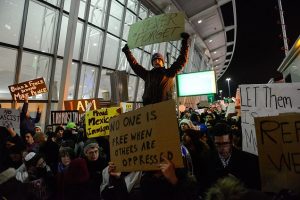
Protestors at JFK Airport (photo by Stephanie Keith/Getty Images).
While the rest of us were eagerly awaiting the livestream of the Ninth Circuit’s oral argument, Hina Shamsi, the Director of the ACLU’s National Security Project, posted a poignant essay on the ACLU website. For those of us covering last night’s legal festivities in the abstract, Shamsi’s post puts the lie to the government’s assertion that this order isn’t intended as a blanket control on anyone from the unwritten and broadly defined “Muslim world.”
In the interest of full disclosure, I worked with Hina when we were both associates at Cleary Gottlieb. In fact, I reached out to her, for the first time since we both worked at the firm, just last week — likely while she was traveling on this very trip.

How You Can Take Control Of Your Firm’s Financial Future
Roadblocks to data-driven business management are falling, and a better bottom line awaits.
Shamsi was flying back from Dominica, a country decidedly not in the Middle East, when she was pulled over for questioning. She flew with a Pakistani passport, even though she’d been a legal permanent resident of the U.S. for over a decade. For those keeping score, Pakistan isn’t one of the countries enumerated in the Trump order. But all those simplistic talking points about a carefully limited ban the government and commentators trot out really don’t matter much when rubber meets the road. Customs and Border Protection agents were always going to take this order and use it as license to harass anyone they could otherize. That’s the spirit of the order, after all. It’s why even Trump’s defenders are so blasé about which specific countries are listed in the order — because those details have little bearing on the point of the order. Shamsi writes:
What was I doing in Dominica? I explained that I am a lawyer working for the American Civil Liberties Union and traveled there for a case. Why, asked the CBP agent holding my Pakistani passport, would someone working for an organization with “American” in its name have “this” passport? And why would someone working for an organization with “American” in its name be representing people who are not citizens? (Perhaps the agent had not heard about ACLU lawsuits challenging the Muslim ban on behalf of noncitizens.)
Oh, my guess is the agent had heard about the ACLU’s efforts, and that factors into a lot of what transpires from here on in — basically a thorough grilling on everything she does for the ACLU.
Lest someone wants to write this off as “just par for the course in that line of work”:

How LexisNexis CourtLink And Lexis Snapshot Deliver Business Wins
These tools demonstrate that information is power.
It didn’t happen during the Bush years when I traveled to meet with and represent Afghan and Iraqi survivors of U.S. military torture, to Guantanamo as an observer at the military commissions there, or to attend meetings and give talks abroad about U.S. human rights abuses in the national security context. It didn’t happen during the Obama years when my work included challenges to unlawful targeted killing, anti-Muslim discrimination, unfair watchlisting, illegal spying, and other U.S. government abuses at home and abroad.
Over all those years, government officials made their views known about this work — often in opposition, sometimes in support. But no government agent ever asked the chilling question I was asked this time: Do you understand why someone might have a different perspective about you?
That’s why orders like this can’t be treated with the facile logic that the government put forth last night. When you open the window to banning people from an arbitrary list of countries without any concrete threat — indeed, when everyone knows that the most high-profile terrorist attacks come from countries not on the list — it’s only a fig leaf for a religious ban. Even Judge Clifton sounded troubled by Rudy Giuliani’s admission that the order was drafted to take a “Muslim ban” and “make it legal.” If the order as applied exacts such a fundamental shift in the treatment of a permanent resident from a non-listed country, it’s a pretty compelling sign that the order has got to go.
As it turns out, Shamsi was set to become a naturalized U.S. citizen the next day. But, despite the rhetoric, I’m not convinced that her new status as an American citizen will shield her from baseless questioning going forward.
Flying Home From Abroad, a Border Agent Stopped and Questioned Me… About My Work for the ACLU [Speak Freely / ACLU]
Earlier: The Best Tweets From The Ninth Circuit Immigration Argument
 Joe Patrice is an editor at Above the Law and co-host of Thinking Like A Lawyer. Feel free to email any tips, questions, or comments. Follow him on Twitter if you’re interested in law, politics, and a healthy dose of college sports news.
Joe Patrice is an editor at Above the Law and co-host of Thinking Like A Lawyer. Feel free to email any tips, questions, or comments. Follow him on Twitter if you’re interested in law, politics, and a healthy dose of college sports news.